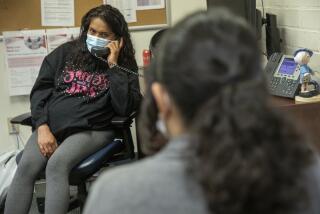States Delay New Medical Benefit for Poor
- Share via
WASHINGTON — Most states, including California, are ignoring a new federal law that requires them to pay Medicare insurance premiums and other medical expenses for the poor, Rep. Henry A. Waxman (D-Los Angeles) charged Wednesday.
Under the law, people with incomes of $423 a month or less are supposed to be exempt from paying the $31.90 a month charged for Medicare Part B, the insurance that helps pay doctor bills. This charge is deducted monthly by the federal government from Social Security checks of more than 30 million Medicare beneficiaries.
The new law, which took effect on Jan. 1, orders states to pay the Part B premium plus other expenses for those whose incomes fall below 85% of the federal definition of poverty, which is $5,980 a year for an individual. The law, thus, applies to those with annual incomes of $5,083 or $423.59 a month.
But many state governments are ignoring the law or delaying its implementation.
“My own state of California doesn’t intend to implement it until next January,” Waxman told a news conference. “We’ve asked for an explanation and haven’t received one. I don’t understand it.”
Cliff Allenby, California secretary of health and welfare, said later Wednesday that priority legislation will be introduced this week to authorize the state to pay benefits on behalf of poor individuals. “Our (state) law does not allow us to take any action like this unless the Legislature concurs,” he said. “We will try to expedite action on the bill. I think it is relatively noncontroversial.”
When the bill is passed, the state, working with the Social Security Administration, will try to identify and contact poor people who are eligible for the new benefit, for which individuals will be required to fill out an application. The state will send names of the eligible to the Social Security Administration, which will stop deducting the $31.90 a month from their Social Security checks.
Public Not Notified
Although the benefit was supposed to begin on Jan. 1, California will not make retroactive payments for money lost during months before the bill is passed and eligible recipients are identified to Washington.
Waxman said the Health Care Financing Administration, which runs Medicare, did not send guidelines to states until December. And federal officials rejected a request by some members of Congress to notify the public by including information with Social Security checks.
As many as 2 million persons over age 65 may be eligible for the benefit, included in the catastrophic care legislation, a Medicare benefits expansion approved by Congress last year.
Poor people of all ages are helped with medical bills under the federal Medicaid program, known as Medi-Cal in California. The new benefit is designed to help people who have too much income to qualify for Medicaid but still live in poverty.
Besides paying the monthly Medicare premium, the new benefit covers the first day of hospital charges and the part of doctor bills not covered by Medicare. In effect, low-income beneficiaries get complete free coverage for all hospital and doctor bills.
Waxman said that only 11 states had implemented the new benefit in January, when it was to begin. Eighteen states are to begin the benefit this month, but it is unclear how many will make vigorous efforts to notify potential recipients.
The survey showing extensive non-compliance with the law was compiled by the Villers Foundation, a nonprofit group focusing on issues concerning the elderly population.
More to Read
Get the L.A. Times Politics newsletter
Deeply reported insights into legislation, politics and policy from Sacramento, Washington and beyond. In your inbox twice per week.
You may occasionally receive promotional content from the Los Angeles Times.










